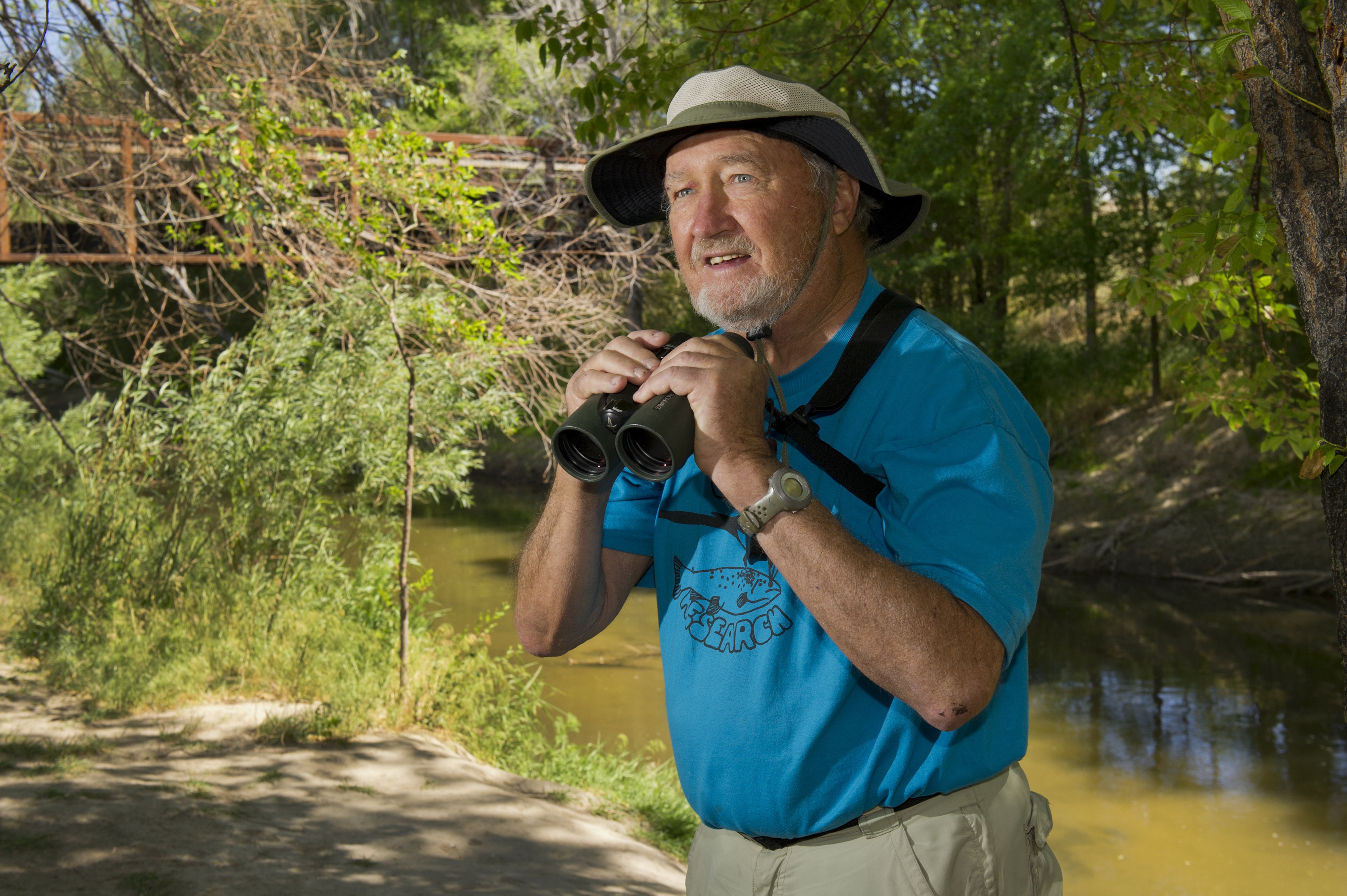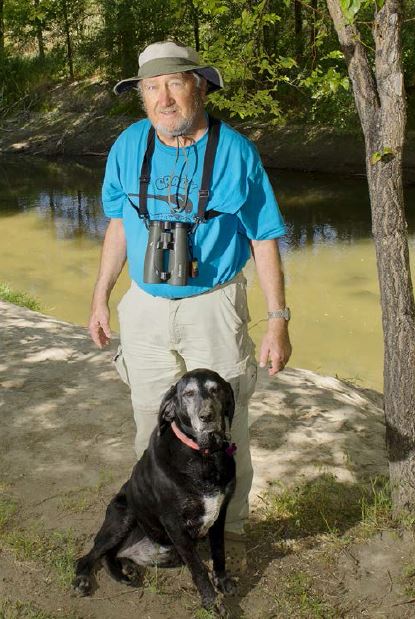And Be Careful about Buying Binoculars

Published in the Fall 2013 issue of Idaho State University Magazine
In the 1940s, many 11- or 12-year-old boys used their saved-up allowances to buy model airplanes or trains, a BB gun (perhaps with the passion of the kid in the movie "A Christmas Story"?) or maybe an erector set.
At that age in that time period, however, Chuck Trost, 79, Idaho State University Professor Emeritus of Biological Sciences, used his precious savings to buy a pair of binoculars. He's been a hardcore birder since that purchase.
Trost, who started life living on a ranch in Colorado before moving to Pennsylvania when he was 12, picked up his passion in Harrisburg, mentored by his biology teacher, Mr. Knorr.
"He knew I was kind of introverted and would never do sports, so he suggested I do a bird list of a city park and that's when I used my allowance to buy binoculars," Trost said. "Once you buy binoculars, you're committed."
Exactly 4,770 bird species later, but who is counting, Trost's commitment and passion towards birding remains intact and has been a constant throughout his existence.
Trost was passionate about birds during the three years he was in the Army and was stationed in Germany from 1953-56. He birded wherever and whenever he could in Europe during this period without the benefit of having any kind of field guide.
"There were no bird books," Trost said. "I had to write down pages and pages of notes about the birds I was seeing to figure out how to identify them."
Using the GI Bill, Trost kept learning about birds and biology, earning a Bachelor's degree in biology from Penn State University, a Master's at the University of Florida and a Doctorate from the University of California Los Angeles before landing a job at ISU.
"Birds just happen to be the hook that lets me see these fascinating fields of science," Trost said.
At ISU, he transferred his love of birds, and probably his second greatest intellectual passion -- the teachings of Charles Darwin and Darwin's contemporary Alfred Russell Wallace - to his undergraduate and graduate students at ISU during his 32 years teaching at the university.
"It was a fantastic job," Trost said. "My god, think about it, I got to babble about birds all the time and teach about evolution. I taught about evolution in my Comparative Anatomy class to a bunch of people who might not have been exposed to it otherwise."
During his time at ISU he mentored 35 Master's students and seven Ph.D. students who earned their degrees, and several more who didn't.
"It was a wonderful experience," he added. "They (the graduate students and some of his undergraduate students, too) are like family. I'm still traveling with a lot of them."
Another part of Trost's legacy in Pocatello is his involvement with the Portneuf Valley Audubon Society, which is celebrating its 40th anniversary in 2013. Trost founded the local chapter. The PVAS has been one of the area's most active conservation and educational groups, raising money and volunteering for a variety of causes and projects (more on the PVAS is available at www.pvaudubon.org/).
Since retiring in 2000 Trost has been on a birding bash. His goal is to identify 5,000 different species of birds. As of late June 2013 he had 4770.
During his lifetime bird chase Trost has visited all the earth's continents and 40 countries, including 32 since retiring. Post-retirement countries he has visited include Argentina, Brazil, Bolivia, Peru, Ecuador and Galapagos (three times) Colombia, Panama, Costa Rica, Honduras (three times), Mexico (three times), England, Ethiopia, Uganda, Ghana, Zimbabwe, Malawi, Namibia, South Africa (3X), Lesotho, Madagascar, Malaysia (Bali, Flores, Komodo, & Borneo), Vietnam, Thailand, Sri Lanka, N. India, China, Australia (three times), and New Zealand, and he has visited the continent Antarctica.
As of this writing, in 2013 Trost had plans to travel to Indonesia to the islands of Sulawesi and Halmahera on a July jaunt, and then to Australia and Tasmania in December.
Trost will keep birding as long as can.
"It's a game and fun to see new birds, and I learn so much by doing it," Trost said. "You're looking at the history of the earth by looking at birds."
`Cheeky' Magpies Do Funerals and Two other Reasons to Love them
 Of the more than 10,000 bird species worldwide and the nearly 5,000 that Chuck Trost has identified on his life list, the ISU Professor Emeritus has one clear favorite: magpies.
Of the more than 10,000 bird species worldwide and the nearly 5,000 that Chuck Trost has identified on his life list, the ISU Professor Emeritus has one clear favorite: magpies.
"I studied them for 20 years and I had several students do their thesis work on them," Trost said. "They belong to the same family that crows do, the Corvids, and are highly intelligent. They do weird things."
Here are some weird things Magpies do:
1) They have funerals. "I don't know why, but magpies will have a funeral over a dead magpie," Trost said. "I suspect they're trying to see what killed the magpie."
2) Having funerals is innate for them. "I hand-reared some magpies taking them from their nest. My black and white baseball cap fell off my head when I was in their cage and they had a funeral for it. They couldn't have learned that behavior." This characteristic has also since been tested by other experiments in the wild.
3) Magpies are really "cheeky," according to Trost. He said male magpies have a linear hierarchy based on when they've hatched, the earlier, the more dominant. The dominant males display and engage in acts that Trost described as "macho" or "showing off" to prove their status. An example of this is when a Cooper's Hawk landed on the roof of the cage of a flock of seven wild young male magpies. While most of the magpies bounced off the walls and squawked, fleeing as far from their natural predator on their cage as they could, the dominate male flew up and pulled a tail feather from his mortal enemy. Many similar actions have also been documented in the wild. Chuck saw a Magpie also pull a tail feather off a Great Horned Owl.
"They're fun to watch to figure out what they're up to," said Trost, who can recount many more weird things that Magpies do that are not listed here.